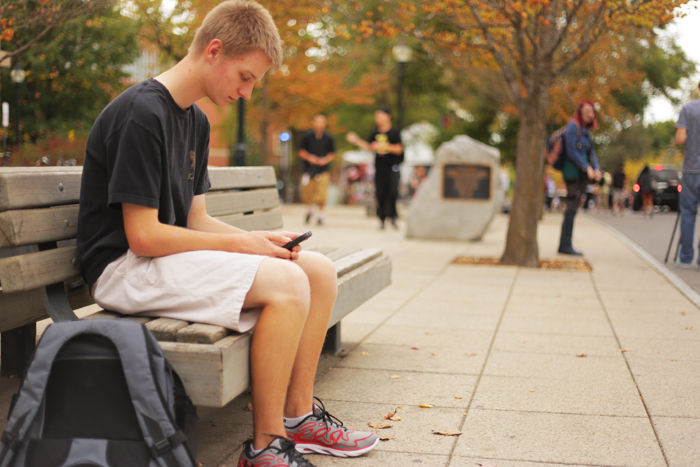Get offline, get involved
Preoccupation with technology may be jeopardizing the ability of students to capitalize on the diverse array of events and programs put on by WSU.
March 23, 2016
As the weather hopefully begins to clear up and sunny days approach on the horizon, the days of sitting inside our cozy rooms will be over, and the chance to go outside will finally be here.
One of the most noticeable aspects of the WSU campus, whether you’re living in a resident hall or constantly moving through the central area of campus, is the numerous events happening on campus. Whether it is a concert, seminar, workshop, reading or any other university-sponsored event, the university even goes out of their way to send informative emails of such events.
Despite availability and advertisement of sponsored events, the majority of students may not be taking advantage of these opportunities, which is disappointing.
Clearly, the university does what it can to advertise events, and student organizations also take the time to spread the word about events going on in the area.
What, then, is the reason for students’ disinterest in participating in various mind-enhancing activities on campus?
One reason could be technology. We often talk about how technology and social media take away so much of our time and concentration. More importantly, it has become a substitute for activities such as perusing the library for a good read with some friends, attending an interesting lecture by guest faculty and other activities which involve, and often require, social and interpersonal skills that amount to more than simply tapping a screen.
“That’s a sociological issue that faces the whole country. The social media output is very ‘me’ oriented,” says William Payne, a music librarian who has been working here for more than 15 years now.
He went on to explain that social media, specifically, takes away skills considered necessary (in the past now) for communicating and simply socializing in general. As a result, individuals are prone to become more self-focused and less community-oriented.
Although technology has transformed our lives almost completely in the past few decades, in some ways for the better, it has also created a rift in our social behavior.
“The result is still the same – taking away the intimacy of communication, and I miss that,” Payne said.
Student participation in scholarly university-sponsored events may never have been sky-high at WSU, but it is disappointing to walk into a conference room or theater stage and find oneself among mere dozens of students that took a few hours of their free time to learn something new.
The fact that we can allow ourselves to spend hours on social media, yet cannot get ourselves to enhance our education at no cost, is shameful.
“It’s a symptom of a problem that’s worse now than ever,” finished Payne.
For a student body of more than 20,000 people, we should respect the time and effort of the many speakers, performers, professionals and specialists that make their way to the Palouse, and at the same time expand our knowledge of the world.
According to Ipsos Open Thinking Exchange (OTX), Americans spend an average of 3.2 hours a day on social networks.
In that case, it should not be difficult to substitute a day’s worth of media to socialize and learn something new.



















